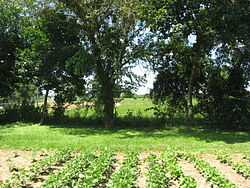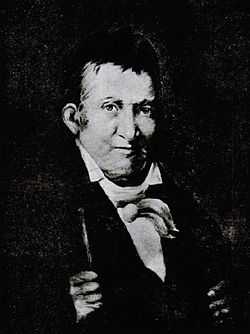Simon Kenton
| Simon Kenton | |
|---|---|
|
Portrait of Simon Kenton from life. | |
| Born |
April 3, 1755 modern Fauquier County, Virginia |
| Died |
April 29, 1836 (aged 81) New Jerusalem, Logan County, Ohio |
Resting place | Oak Dale Cemetery, Urbana, Ohio |
Simon Kenton (April 3, 1755 – April 29, 1836) was a famous United States frontiersman and soldier in West Virginia, Kentucky and Ohio. He was a friend of Daniel Boone, Simon Girty, Spencer Records, Thomas S. Hinde, Dr. Thomas Hinde, and Isaac Shelby. He served the United States in the Revolution, the Northwest Indian War and the War of 1812. Surviving the gauntlet and ritual torture, in 1778 he was adopted into the Shawnee people. He married twice and had a total of ten children.
Family and early life
Simon Kenton was born at the headwaters of Mill Run in the Bull Run Mountains on April 3, 1755, in what is now Fauquier County, Virginia to Mark Kenton, Sr. (an immigrant from Ireland) and Mary Miller Kenton (whose family was Scots-Welsh in ancestry). (His birthplace was then part of Prince William County prior to formation of Fauquier in 1759). In 1771, at the age of 16, thinking he had killed a man in a jealous rage (the fight began over the love of a girl), Kenton fled into the wilderness of West Virginia, Kentucky, and Ohio, where for years he went by the name "Simon Butler." After learning that his victim had lived, Kenton took back his original surname.
Noted activities

In 1774, in a conflict later labeled Dunmore's War, Kenton served as a scout for the European settlers against the Shawnee Indians in what is now West Virginia and Kentucky. In 1777, he saved the life of his friend and fellow frontiersman, Daniel Boone, at Boonesborough, Kentucky.
The following year, Kenton was rescued from the Shawnee in Ohio by Simon Girty. He had survived many days of running the gauntlet and various other ritual tortures that usually caused death. He was later taken about 50 miles for more torture at Sandusky. There he was saved by Pierre Drouillard, an interpreter for the British Indian department and father of explorer George Drouillard.[1] The Shawnee respected Kenton for his endurance; they named him Cut-ta-ho-tha (the condemned man). He was "adopted into the tribe by a motherly squaw whose own son had been slain."[1]
Kenton served as scout on the famous 1778 George Rogers Clark expedition to capture Fort Sackville during the American Revolution. Independence did not mean an end to warfare; in 1793-94 Kenton fought in the Northwest Indian War with "Mad" Anthony Wayne.
In 1810 Kenton moved to Urbana, Ohio, where he achieved the rank of brigadier general of the state militia. He served in the War of 1812 as both a scout and as leader of a militia group in the Battle of the Thames in 1813. This was the battle in which the famous Indian chief Tecumseh was killed. Kenton was chosen to identify Tecumseh's body but, recognizing both Tecumseh and another fallen warrior named Roundhead, and seeing soldiers gleefully eager to carve up Tecumseh's body into souvenirs, he identified Roundhead as the chief.[2]
A large boulder located on the west side of the Ritter Public Library in Vermilion, Ohio is inscribed "KENTON" and is believed to have been carved by Kenton himself. It was found on a farm a few miles to the south.(See photo at )
Marriage and family
Kenton married Martha Dowden and they had four children together.[1] After she died in a house fire, the widower married Elizabeth Jarboe as his second wife. He had six children with her.
Kenton died in (and was initially buried at) New Jerusalem in Logan County, Ohio. His body was later moved to Urbana.
Later his widow Elizabeth Jarboe Kenton and a number of their children moved to northwestern Indiana, to an area straddling Jasper, White, and Pulaski counties. It was heavily settled by families who migrated from Champaign County, Ohio, where Kenton is buried.
Namesakes
The city of Kenton, the county seat of northwestern Ohio's Hardin County, was named for him, as is a local school for the developmentally disabled in Hardin County.
Kenton County, Kentucky is named for him,[3] as is Simon Kenton High School in Independence, the county seat. A statue honoring him was erected in Covington, Kentucky's Riverside Drive Historic District, overlooking the Ohio River.
Simon Kenton Elementary Schools were named in Xenia and Springfield, Ohio.
Simon Kenton Road is a residential street at the base of Bull Run Mountain in Prince William County, Virginia.
The Boy Scouts of America have the Simon Kenton Council, a division covering Central Ohio to northern Kentucky.
In the Frontiersman Camping Fellowship of the Royal Rangers, Indiana is designated the Simon Kenton Chapter.
The Simon Kenton Pub in Bath County, Virginia is named after him.
The Simon Kenton Inn in Springfield is named for him. It is located where Kenton first settled in Ohio during the spring of 1799.
The Simon Kenton Memorial Bridge is a suspension bridge built in 1931 that crosses the Ohio River and connects Maysville, Kentucky and Aberdeen, Ohio.
References
- ↑ 1.0 1.1 1.2 Jean Backs, "Simon Kenton-Frontier Hero" at the Wayback Machine (archived March 4, 2006), Explore, Fall-Winter 2003
- ↑ Eckert, Allen W., The Frontiersman (Bantam Books, Little, Brown & Company, Inc., 7th Printing, 1980), pp. 687-90.
- ↑ The Register of the Kentucky State Historical Society, Volume 1. Kentucky State Historical Society. 1903. p. 35.
- Kenton, Edna. Simon Kenton: His Life and Period, 1755-1836. Originally published 1930; reprinted Salem, NH: Ayer, 1993.
- Crain, Ray. Simon Kenton: The Great Frontiersman. Available in either hardback or paper back; Published June 1, 1992; ISBN 0-9641149-5-X
- Clark, Thomas D. Simon Kenton: Kentucky Scout; Originally published 1943; 1971 paperback reprint edition, Jesse Stuart Foundation; ISBN 0-945084-39-0.
- Eckert, Allan W. The Frontiersmen: A Narrative; Originally published 1967; 2001 paperback reprint edition, Jesse Stuart Foundation; ISBN 0-945084-91-9. Popular history in narrative form.
External links
| Wikimedia Commons has media related to Simon Kenton. |
- The Official Simon Kenton page
- Simon Kenton at Ohio History Central.
- Allen, William B. (1872). A History of Kentucky: Embracing Gleanings, Reminiscences, Antiquities, Natural Curiosities, Statistics, and Biographical Sketches of Pioneers, Soldiers, Jurists, Lawyers, Statesmen, Divines, Mechanics, Farmers, Merchants, and Other Leading Men, of All Occupations and Pursuits. Bradley & Gilbert. pp. 33–40. Retrieved 2008-11-10.
|
